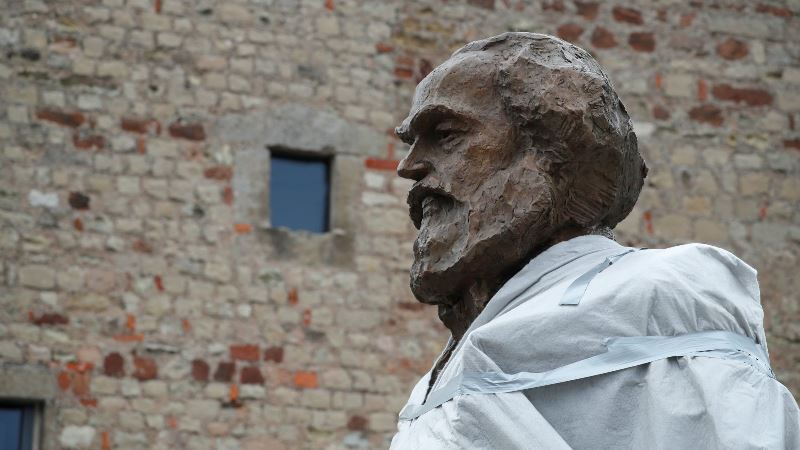One need not be an orthodox Marxist to acknowledge that Karl Marx was a gifted thinker who encouraged us to look at the world critically, and strive for the dream of a future emancipatory society. Enough has been said and written about the vast canvas of his worldview and methods of enquiry–from the postulates of historical materialism to the dialectical logic, from the theory of labour to surplus value, from conflict theory to human alienation in a divided society.
However, one thing that continues to strike us is the way he looked at the formation and functioning of the state in a class- divided society. For instance, in a capitalist society, as he elaborated, the ruling bourgeois classes have complete monopoly over the functioning of the state. Even though the state can project itself as ‘neutral’, or there can be a constitutional principle of periodic elections and right to vote, the fact is that, as Marx thought, the state with its coercive apparatus–police, army, law and prisons–would control or suppress the ideas and practices which are capable of disrupting the dominant interests of the ruling class. History provides ample illustrations to prove the prevalence of the coercive nature of the state.
With the advancement of capitalism and expansion of ‘civil society’–newspapers, compulsory schooling and other religious/cultural organizations, the state, it seems, has become more sophisticated. It does not use merely its coercive apparatus to retain the interests of the dominant class. It tends to become ‘ethical’ by using the network of ‘civil society’, and creating a cultural domain in which even the oppressed tend to accept the ‘sanctity’ of the values of the ruling class. Antonio Gramsci demonstrated and analyzed this process of ‘hegemony’ through which the ruling class succeeds in acquiring the consent from those over whom they rule. Take an illustration. Capitalism is centered on the principles of competition, meritocracy and free market. It is not that you and I are coerced to believe in these principles by the cops and the army. Today, thanks to school education and other cultural practices, we have almost internalized the belief that competition is desirable, free market taps the talent of the most ‘meritorious’ one, and if you cannot make it, the fault lies in you–you are not sufficiently educated, talented and meritorious. In other words, there is no problem with the distribution of social wealth or the possession of the larger share of the economy by a tiny section of society because your poverty/unemployment has to be explained in terms of your deficiency! No wonder, as the process pf hegemony becomes successful, we all tend to become like the rich; we begin to celebrate the desirability of inequality; we love to sing the praises of the mighty–the Ambanis and the Adanis of the world in the gossip columns, television shows and cricket matches.
Now in the era of global capitalism we have moved another step forward. Beyond ‘domination’ and ‘hegemony’–we are in the realm of ‘seduction’. Today capitalism seduces us with its glitz and spectacles, its billboards and malls, its erotic symbols and lifestyle packages. As consumers we redefine ourselves; we are well-fed/well/clothed commodities in the market place; and the market enters everywhere–even in our bed rooms. Possibly, Marx , because of his historic location in the 19th century, could not visualize the shape of late capitalism. However, the new generation of thinkers influenced by Marx–the thinkers like Herbert Marcuse and Zygmunt Bauman–have given us the insights into this spectacle. In fact, these days, as a look at contemporary India would suggest, all three practices–domination, hegemony and seduction–surround our existence. A ‘Maoist’ professor has to be sent to jail, and the ‘dissenters’ are bound to be killed in the ‘encounters. Again, the IITs and IIMs have to be sanctified because of their ability to spread the hegemony–the ability to normalize and sanctify the logic of competition, achievement, success and ‘efficiency’ of corporate capitalism. Simultaneously, there is great ‘fun’ with fancy gadgets, shopping and conspicuous consumption and beauty industry!
Well, Marx could be criticized for many reasons. His ‘economic determinism’, his notion of the growing pauperization of the working class, his notion of ideology as ‘false consciousness’–the commentators have reminded us of the limits to Marxism. However, what retains his charisma alive is the lesson of critical thinking that he sought to teach us for removing the layers of falsehood clouding our minds. In a way, Marx was the philosophic grandfather of all of them–Antonio Gramsci, Herbert Marcuse, Zygmunt Bauman and even Michel Foucault.
On his birth anniversary we are happy to express our gratitude to the prophet of modern times.
***








